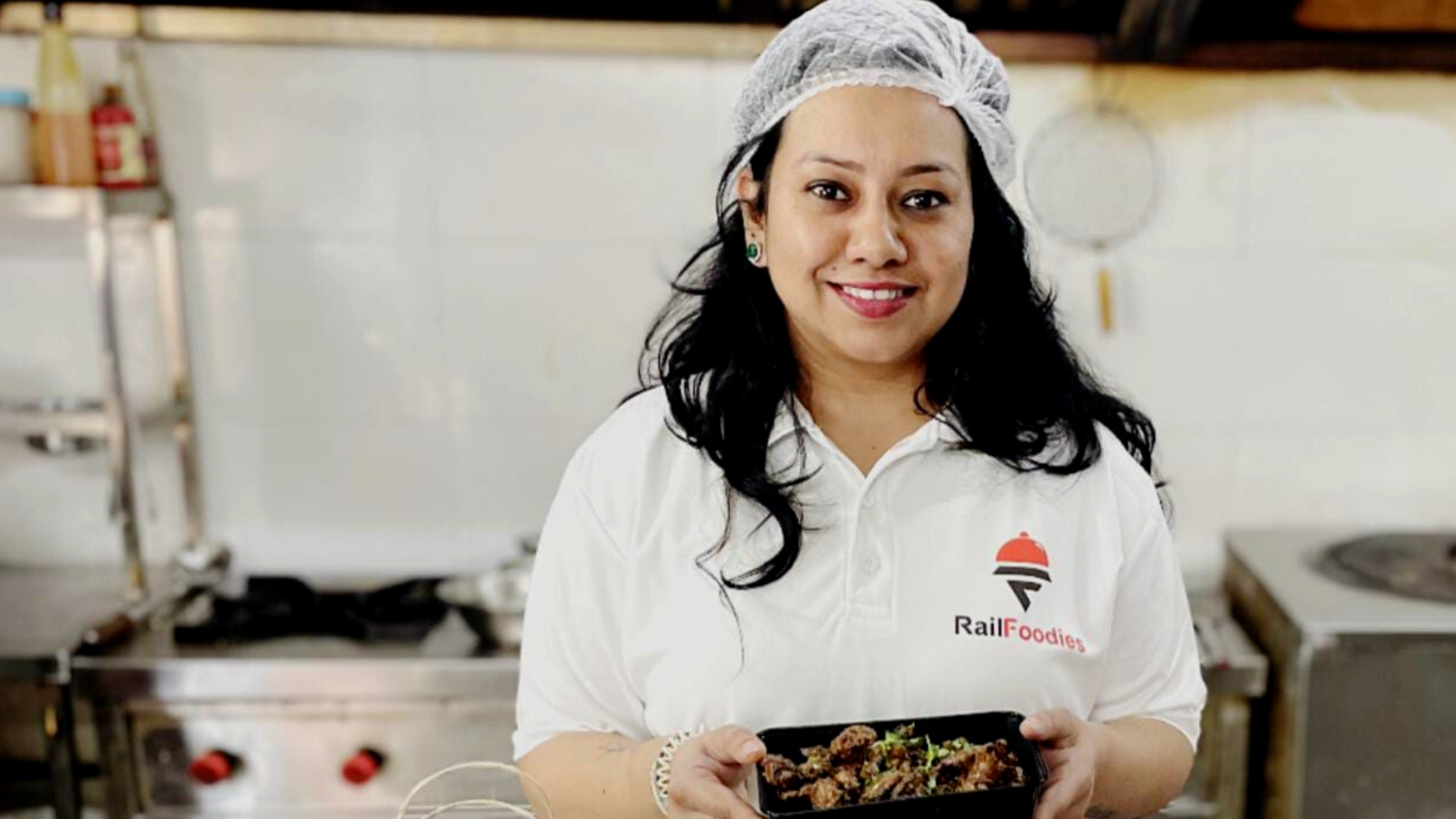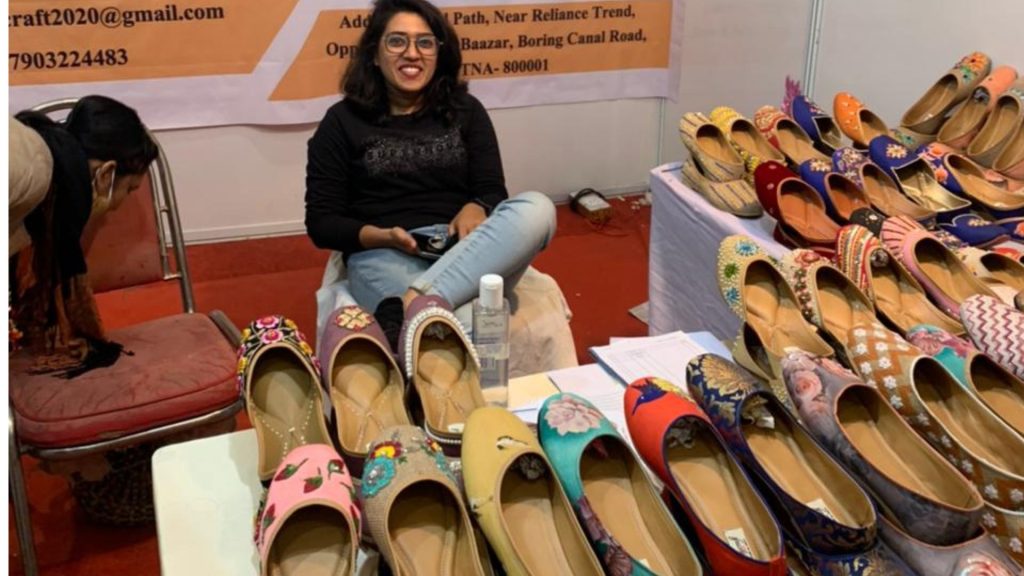A U.S. Embassy program helps women entrepreneurs create and grow their businesses.
March 2023

Sonal Patel’s RailFoodies promises fast delivery of a variety of quality meals directly to passengers while they are traveling. (Photograph courtesy Sonal Patel)
Sonal Patel and Rashmi are women entrepreneurs from Patna, who have scaled up their businesses after participating in the U.S Department of State’s Academy for Women Entrepreneurs (AWE) program. They also recently won funding of Rs. 10 lakh each as interest-free loans from the Bihar government’s Start-up Policy program.
Recognizing that entrepreneurs are crucial to a country’s economic development, and that women entrepreneurs have a significant role to play in advancing gender equality and inclusive growth, the State Department launched the AWE to empower entrepreneurs and early-stage business owners through training and mentorship.
Since 2019, AWE has empowered more than 16,000 women in 80 countries with the knowledge, networks and access they need to launch and scale successful businesses and ensure increased participation of women in the workforce. A 2021 evaluation showed that 74 percent of women who complete the AWE program increase their business earnings and 29 percent hire more staff.
Meals on wheels
Before Patel participated in the U.S. Consulate General Kolkata’s AWE training, she was the owner of a management company in Patna that helped local artisans sell their products in the United Arab Emirates. A life-skills trainer by profession, Patel earlier worked as a corporate trainer in Dubai, Mumbai and Bihar.
She entered the 10-month AWE training in November 2021 as the owner of a fledgling business but without a clear business plan. During the training, she realized that her current company may not grow further and decided to shift to railway catering. Having long felt there was room for improvement in the food available to passengers on Indian trains, Patel created a business plan for RailFoodies during her AWE training. RailFoodies promises fast delivery of a variety of quality meals directly to passengers while they are traveling. More than 400 restaurants have signed up to deliver to over 200 stations, mostly in Bihar.
Passengers order food by calling directly or through the RailFoodies website that displays the menus of the restaurants serving each railway station. They can place orders up to one hour before their arrival at a station, and pay online or on delivery.
RailFoodies employs eight people—half of them work on software development, including creation of a dedicated app, and others work on marketing. Although still at the pilot stage, “the food delivery service has won positive reactions,” says Patel. The company’s five-year goal is to expand across India and create “cloud kitchens” serving numerous railway stations and providing standardized menus at competitive prices.
For Patel, the AWE training was an “eye-opener.”
“I thought I was a good trainer. But after the training, I felt there was a lot missing [in my training] in terms of business, finance, hiring, etc.,” she says.
In the near future, Patel plans to start her own delivery fleet with an earn-and-learn model for students to work part-time with RailFoodies, creating employment for thousands of people across India.
Local craft, global market
A graduate of the National Institute of Fashion Technology in Patna, Rashmi started her career as a designer for a handicrafts company. In early 2020, she started her own handicrafts company, but it was forced to close down due to the COVID-19 pandemic. At the end of 2021, she launched her current company, Dhajcraft. The name is inspired by the Hindi word for “adorn” and “yarn.” Dhajcraft makes handcrafted products from yarn.
Rashmi was selected for a four-month AWE training. Among the very first things she learned was how to pitch to investors. The cohort later attended trainings on marketing, and branding companies and products. The training ended with a pitching session at the U.S. Consulate General in Kolkata. Rashmi says the AWE training was very useful for small business owners like her. “I learned a lot—like how to prepare a three-minute pitch to investors,” she says. The training also helped her build a network. “Now I know where to get help in various areas,” she says.

With the help of local artisans, Rashmi’s start-up Dhajcraft manufactures 900 pairs of shoes per month. (Photograph courtesy Rashmi Rani)
Dhajcraft produces customized women’s and men’s shoes based on foot shapes. “Most of us have flat feet, or arch problems, or wide feet or differently shaped feet,” explains Rashmi. The Dhajcraft sales portal asks customers to send their sizes by using a printable measurement sheet, or share videos of foot problems. Her team is now developing an app to produce measurements from a smartphone’s video camera. Dhajcraft’s product range includes embroidered mojaris, loafers, mules, formal shoes, brocade wedges, heels and sneakers.
The start-up uses recycled plastic and natural fibers like khadi and jute to craft the footwear. These shoes are sold both in offline and online stores. The company currently has three craftsmen and five other employees. “Online advertising is ramping up, and the business is expanding,” says Rashmi. Customers have already provided very positive feedback, she says, as her products are “solving their problem of foot pain while walking or driving, or from standard shoes that don’t suit their wide feet.”
Burton Bollag is a freelance journalist living in Washington, D.C.
COMMENTS